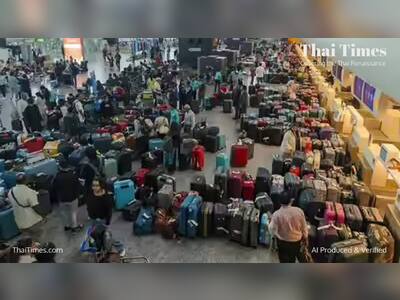0:00
0:00
Thailand Faces Tourism Challenges as Chinese Visitors Shift to Japan
Concerns over safety and emerging competition from Japan and Singapore impact Thailand's tourism targets.
Thailand's aspiration to attract 9 million Chinese tourists in 2025 is under significant threat as recent events, including the kidnapping of Chinese actor Wang Xing, have raised alarm over safety in the country.
The surge in flight cancellations to Thailand—reportedly increasing by 94% last month—highlights the shift in Chinese travelers' preferences towards destinations perceived as safer, such as Japan and Singapore.
The kidnapping incident, which involved Wang being abducted to Myanmar via Thailand, has catalyzed a wave of cancellations among mainland Chinese tourists during the Lunar New Year season.
Analyses indicate that trips to Thailand have lagged behind previous years, further exacerbated by travelers' increased caution.
In response to these incidents, the Thai government has intensified efforts to combat criminal elements operating within its borders, enforcing stricter regulations against scammers and those involved in human trafficking activities.
Nonetheless, these measures have yet to fully assuage safety concerns among potential visitors from China, who remain wary.
Analyst Eric Zhu has noted that negative news surrounding safety is overshadowing the government’s attempts to improve security, presenting a considerable hurdle for Thailand to restore its reputation as a safe and desirable travel destination for Chinese tourists.
Conversely, Japan has recorded a significant increase in the number of Chinese tourists, with bookings from China more than doubling in the first quarter compared to last year.
Favorable exchange rates and competitive airfare options, such as flights priced as low as $150 from Shanghai to Tokyo, have further contributed to Japan surpassing Thailand as the preferred overseas destination during the recent holiday period.
According to the Japan National Tourism Organization, Japan attracted a record 980,000 Chinese tourists last month, a notable increase over 2024 figures, while Thailand reported approximately 711,000 Chinese visitors by early February.
In addition to Japan, the visa-free travel options to Singapore and Malaysia have diverted potential tourists away from Thailand, underscoring a need for the Thai tourism sector to adapt to evolving market dynamics.
Thailand's government has responded by initiating cooperative measures with Myanmar to dismantle illicit operations responsible for trafficking individuals into cyber-scam centers.
Recent crackdowns have led to the release of over 1,000 foreign workers, including hundreds of Chinese nationals.
Despite ongoing efforts, analysts caution that Thailand's ability to reach its ambitious target of Chinese arrivals remains uncertain.
Projections indicate that without addressing safety concerns promptly, Thailand may struggle to exceed 7.5 million Chinese tourists in 2025, significantly below the targeted numbers.
While there are preliminary signs that apprehensions regarding travel to Thailand may be easing, demand remains inconsistent.
March flight bookings are still approximately 10% lower on a week-to-week basis; however, there are indications of growth in flight demand for April and May, reporting an increase of over 3%.
Industry representatives, such as Thienprasit Chaiyapatranun, President of the Thai Hotel Association, have suggested that in addition to enhancing safety measures, Thailand must broaden its tourism offerings beyond the well-known regions of Bangkok, Phuket, and Chiang Mai to remain competitive.
He emphasized the need to cultivate new attractions in order to captivate both international and domestic travelers, noting that even Thai citizens are increasingly choosing to visit Japan over domestic destinations.
The surge in flight cancellations to Thailand—reportedly increasing by 94% last month—highlights the shift in Chinese travelers' preferences towards destinations perceived as safer, such as Japan and Singapore.
The kidnapping incident, which involved Wang being abducted to Myanmar via Thailand, has catalyzed a wave of cancellations among mainland Chinese tourists during the Lunar New Year season.
Analyses indicate that trips to Thailand have lagged behind previous years, further exacerbated by travelers' increased caution.
In response to these incidents, the Thai government has intensified efforts to combat criminal elements operating within its borders, enforcing stricter regulations against scammers and those involved in human trafficking activities.
Nonetheless, these measures have yet to fully assuage safety concerns among potential visitors from China, who remain wary.
Analyst Eric Zhu has noted that negative news surrounding safety is overshadowing the government’s attempts to improve security, presenting a considerable hurdle for Thailand to restore its reputation as a safe and desirable travel destination for Chinese tourists.
Conversely, Japan has recorded a significant increase in the number of Chinese tourists, with bookings from China more than doubling in the first quarter compared to last year.
Favorable exchange rates and competitive airfare options, such as flights priced as low as $150 from Shanghai to Tokyo, have further contributed to Japan surpassing Thailand as the preferred overseas destination during the recent holiday period.
According to the Japan National Tourism Organization, Japan attracted a record 980,000 Chinese tourists last month, a notable increase over 2024 figures, while Thailand reported approximately 711,000 Chinese visitors by early February.
In addition to Japan, the visa-free travel options to Singapore and Malaysia have diverted potential tourists away from Thailand, underscoring a need for the Thai tourism sector to adapt to evolving market dynamics.
Thailand's government has responded by initiating cooperative measures with Myanmar to dismantle illicit operations responsible for trafficking individuals into cyber-scam centers.
Recent crackdowns have led to the release of over 1,000 foreign workers, including hundreds of Chinese nationals.
Despite ongoing efforts, analysts caution that Thailand's ability to reach its ambitious target of Chinese arrivals remains uncertain.
Projections indicate that without addressing safety concerns promptly, Thailand may struggle to exceed 7.5 million Chinese tourists in 2025, significantly below the targeted numbers.
While there are preliminary signs that apprehensions regarding travel to Thailand may be easing, demand remains inconsistent.
March flight bookings are still approximately 10% lower on a week-to-week basis; however, there are indications of growth in flight demand for April and May, reporting an increase of over 3%.
Industry representatives, such as Thienprasit Chaiyapatranun, President of the Thai Hotel Association, have suggested that in addition to enhancing safety measures, Thailand must broaden its tourism offerings beyond the well-known regions of Bangkok, Phuket, and Chiang Mai to remain competitive.
He emphasized the need to cultivate new attractions in order to captivate both international and domestic travelers, noting that even Thai citizens are increasingly choosing to visit Japan over domestic destinations.











